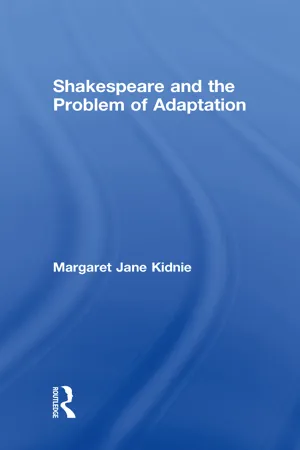
- 220 pages
- English
- ePUB (mobile friendly)
- Available on iOS & Android
Shakespeare and the Problem of Adaptation
About This Book
'Kidnie's study presents original, sophisticated, and profoundly intelligent answers to important questions.' - Lukas Erne, University of Geneva
'This is a fine and productive book, one that will surely draw significant attention and commentary well beyond the precincts of Shakespeare studies.' - W.B. Worthen, Columbia University
Shakespeare's plays continue to be circulated on a massive scale in a variety of guises – as editions, performances, and adaptations – and it is by means of such mediation that we come to know his drama. Shakespeare and the Problem of Adaptation addresses fundamental questions about this process of mediation, making use of the fraught category of adaptation to explore how we currently understand the Shakespearean work. To adapt implies there exists something to alter, but what constitutes the category of the 'play', and how does it relate to adaptation? How do 'play' and 'adaptation' relate to drama's twin media, text and performance? What impact might answers to these questions have on current editorial, performance, and adaptation studies?
Margaret Jane Kidnie argues that 'play' and 'adaptation' are provisional categories - mutually dependent processes that evolve over time in accordance with the needs of users. This theoretical argument about the identity of works and the nature of text and performance is pursued in relation to diverse examples, including theatrical productions by the Royal Shakespeare Company, the BBC's ShakespeaRe-Told, the Reduced Shakespeare Company, and recent print editions of the complete works. These new readings build up a persuasive picture of the cultural and intellectual processes that determine how the authentically Shakespearean is distinguished from the fraudulent and adaptive. Adaptation thus emerges as the conceptually necessary but culturally problematic category that results from partial or occasional failures to recognize a shifting work in its textual-theatrical instance.
Frequently asked questions
Information
Table of contents
- Cover
- Title
- Copyright
- Dedication
- Contents
- List of illustrations
- Acknowledgements
- Introduction: the problem of adaptation
- 1 Surviving performance: Shakespeare's contested works
- 2 Defining the work through production, or what adaptation is not
- 3 Entangled in the present: Shakespeare and the politics of production
- 4 Adapting media: ShakespeaRe-Told by the BBC
- 5 Textual origins
- Notes
- Bibliography
- Index